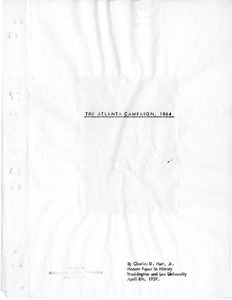| dc.rights.license | In Copyright | en_US |
| dc.creator | Hurt, Charles D., Jr. | |
| dc.date.accessioned | 2023-10-20T18:01:03Z | |
| dc.date.available | 2023-10-20T18:01:03Z | |
| dc.date.created | 1959 | |
| dc.identifier | WLURG038_Hurt_thesis_1959 | |
| dc.identifier.uri | https://dspace.wlu.edu/handle/11021/36480 | |
| dc.description.abstract | Despite Hood's contention that Atlanta was untenable, the army under Joseph E. Johnston could have held out for a Iong period of time, as Sherman simply did not have sufficient forces to take Atlanta. At Ieast, he did not have sufficient numbers until Hood, in one week, did what Sherman had been unable to do in three months; he destroyed the Army of Tennessee. Johnston had refused to stand in the open in pitched battle, in order to conserve his forces for the defense of Atlanta. It is a tragedy that he had to fight not only the FederaI Army, but also the Confederate adrninistration. If he had been Ieft in command, and if he had been supported by Richmond, Johnston could have and would have defended Atlanta. Of course, he could not have held it "forever", but he did not need to hold it forever. The Noth was in great unrest, as the Peace Party was growing daily in the midst of draft riots and criticisms of President Lincoln, who was determined to press the war to a successfuf conclusion. Recognizing the politlcal as well as military aspects of the war, Johnston was playing for time when he was removed. If Ieft in command, he would probably have attacked at Peachtree Creek, as the division of the Federal Army afforded a chance of success. If he had been unsuccessful, however, he would have fallen back to the previously prepared strong lines of Atlanta, maintaining the army necessary for the defense of Atlanta. If Atlanta had been held through the fall of 1864, the war might have taken a different turn, as McClelIan and the Peace Party might have been victorious. By 1864 the South did not need tremendous and brilliant offensive victories; it needed only negative results. Johnston would have held Atlanta long enough to provide negative resuits, but Hood gave the North positve victory by failing to maintain the army to utilize the fortifications around Atlanta. Wiith the falI of Atlanta, the campaign was finished and the hopes of the South ended. [From concluding section] | en_US |
| dc.format.extent | 110 pages | en_US |
| dc.language.iso | en_US | en_US |
| dc.rights | This material is made available for use in research, teaching, and private study, pursuant to U.S. Copyright law. The user assumes full responsibility for any use of the materials, including but not limited to, infringement of copyright and publication rights of reproduced materials. Any materials used should be fully credited with the source. | en_US |
| dc.rights.uri | http://rightsstatements.org/vocab/InC/1.0/ | en_US |
| dc.title | The Atlanta Campaign, 1864 | en_US |
| dc.type | Text | en_US |
| dcterms.isPartOf | WLURG038 - Student Papers | en_US |
| dc.rights.holder | Hurt, Charles D., Jr. | en_US |
| dc.subject.fast | Atlanta Campaign (1864) | en_US |
| dc.subject.fast | Johnston, Joseph E. (Joseph Eggleston), 1807-1891 | en_US |
| dc.subject.fast | American Civil War (United States : 1861-1865) | en_US |
